Screenwriting
We've talked a lot about the standard mechanics of story writing. I think it's time for us to start to explore the world of script writing.
I know what you're thinking. "Mr. Tuna! I know how to script write. It's so easy! You just write the character name, then the dialogue!"
I'm afraid not. If you write a script like that and try to send it to someone, they'll take one look at it and they will toss it in the garbage.
However, since it's a lot easier to picture something by showing it, why don't I show you my meaning? First and foremost, however, I should recommend a script writing software.
The one I've used most is called Celtx. I've used it for approximately 10 years. It's still free but as I understand requires an account now and you can't just download it to your computer any more unfortunately. That being said, I've moved over to another reasonable choice called Trelby. It's simplistic and if you're already a Celtx user you can transfer your files over to Trelby as needed.
So let's get started with the TITLE PAGE!
First and foremost, if you're using a script writing software, it's going to probably shave a good amount of time off this part. It must be formatted as you see here. Otherwise, down the trash chute it goes. "Written By" is fairly optional. As long as you write "By" followed by your FULL NAME. No nicknames. The bottom right side of the script can be used for copywriting if you wish, but it's optional, and you can alternate where your identifiable information goes as well, as long as its in one of the bottom corners.
If your phone number, address, and email address are not in one of the bottom corners, your script will probably be thrown out. If not, and they decide they really like it, they'll just steal your work and pass it off as their own. Happens all the time, and you won't win that fight. As the writer, you're the second LOWEST tier on the totem pole. You have no say in who plays what. You have no influence over how your work is imagined. The only person lower on the chain of command then you is the craft services guy. Just be forewarned. If you become a screen writer and you aren't someone like Quentin Tarantino, you have no power.
But you WILL make bank. Because you're selling your work.
If you become a play writer, you'll probably make less money, but you will have ALL the power. Because in that case you are renting your work out. If you don't like how the set designer is doing things, you can threaten to take away their right to use the play. It won't make you any friends, but you'll have more leeway in that field, even if you're making less money. So if you're in this to stroke your ego, go theater. We will cover play writing in another update. It's fairly straightforward.
Next, let's get started on the actual writing! So let's address our slugline, sort our actions, and form some dialogue!
What the hell am I talking about? Well... Let's start with the SLUGLINE:
A slugline, also known as your scene heading, is your main transition and how you define the current location and time of the scene you're about to cover. Every slugline should include these three things, in this order:
WHETHER THE SCENE TAKES PLACE INSIDE OR OUT, THE LOCATION IT TAKES PLACE IN, AND THE GENERAL TIME FRAME.
For example: Suppose we were writing a scene that takes places inside a convenience store in the day. We would signify that as follows:
INT. CONVENIENCE STORE - DAY
If the scene took place outside a house at night, it would be written as follows:
EXT. HOUSE - NIGHT
YOU ARE EXPECTED TO ABBREVIATE INTERIOR OR EXTERIOR.
In some cases, you can belay the use of the day/night selection. For instance:
EXT. SPACE
In space, the day/night cycle is probably not going to be quite as important, so it's understandable to excuse it here.
If you need to include additional information in your slugline, you can add a small description after your location. But KEEP IT DOWN TO A FEW WORDS:
INT. CONVENIENCE STORE - BACKROOM - DAY
Your slugline is how each scene is expected to open, and by using a new slugline you'll be suggesting to the reader that you are now in a different scene. After the slugline, you can either use dialogue or actions. It's generally better and more accepted to BEGIN WITH ACTIONS:
Your actions are the meat and potatoes of your script. You will always write actions in the PRESENT TENSE. Additionally, you can not make any off comments about who you would like to see play which character, or the music you want in the scene. Nobody cares, and your script will be tossed if you do so. Say what needs to be said and move on:
A man of medium build with short brown hair and a white t-shirt stands in profile against a wall. He maintains a blank expression; his mouth perpetually hangs open. He turns his back to the camera. He pauses a moment before the wall behind him, and then turns for his opposite profile.
This sample defines what actions this character will be taking. It says nothing of where to put the camera because that much will be more up to the crew. You can suggest where the camera goes, but I usually leave that out. It's easier on you that way.
If you have something happening in this action that is important, you can CAPITALIZE IT. When a character is first introduced in the narrative, his or her name should be CAPITALIZED. Afterwards, you can write the name normally if you'd like. I personally like to capitalize it all throughout the script though. It's just easier to pick out that way and there's no harm either way.
A scraggly haired older man stares blankly down the street from a prone position on the sidewalk. He lay upon discarded newspapers and flattened cardboard boxes. His face is dirty and his beard is unkempt. His eyes never falter from the street. This is TIN CAN.
Now we know the basics of narrative focus and action writing. But take this to heart:
INCLUDE NOTHING IN YOUR SCRIPT THAT CAN NOT BE EITHER DIRECTLY SEEN OR HEARD.
This means you can't include smells, taste, or touch. Why? Because the audience can not sense smells, tastes, or touch that the characters will sense.
So:
JIM'S eyes widen slightly. He let out a silent fart. It smelled dreadful.
First of all, props for going for that top quality humor. But how is the viewer supposed to know that Jim stepped on a duck if we don't hear anything from him? We just see a guy widen his eyes.
So what are your options?
You can have Jim say what happened. "I farted."
Or you can do it the smart way and play to the actions:
JIM'S eyes widen slightly and the smile slowly leaves his face. His coworkers begin to audibly sniff at the air and murmur complaints among themselves. JIM breaks out in a COLD SWEAT.
JIM
(whispering)
I thought it was going to be silent...
Dialogue ought to be centered on its own personal line, and the character's name is the first thing you should see. The parenthesis are optional in the middle there. Use them only if you need to convey something specific... like how a line should be delivered. Or if two lines are said simultaneously:
ARTHUR
(simultaneously)
What? What do you mean it's my fault?! I followed your EXACT fucking orders! Tahiti this, Tahiti that! You've gone crazy Dutch!
DUTCH
(simultaneously)
You asked my opinion, so I gave you my opinion! It's your fault! If you were more forceful, we wouldn't be in this situation and my plan would've worked.
If you have a lot of dialogue for one character to cover, you may be required to write "CONT'D" next to the subject name. This is only needed when the dialogue is, well, continuous:
PETE
Patient John Smith, age 26, is a troubled, but not at all incurable soul. He demonstrates a variety of delusions of grandeur and there is evidence to suggest possible abuse as a child. It is theorized he was the subject of extreme bullying growing up, and perhaps that is why he lashes out today.
PETE turns a page in his report, then spares a look at his voice recorder.
PETE (CONT'D)
Mr. Smith was advised to begin counting to ten whenever he feels anger coming on and was also advised to limit his intake of sugars and alcoholic beverages, as well as any drugs he may use that he has not told me of yet.
PETE looks at his watch, and he lets out a sigh.
PETE (CONT'D)
When asked about possible drug use, Mr. Smith replied with no more than a shrug. When asked if he cared about living anymore, the answer was also a shrug. It is recommended that his case be referred to Dr. Switchenbarkervonquebuebue as soon as possible. If he is handled properly, his prognosis looks excellent.
If your character is narrating, you can signify this by including the abbreviation of V.O, which stands for "voice over."
MIKE (V.O)
My name is Michael Weston. I used to be a spy until I was burned. When you're burned, you've got nothing. No cash, no credit, no job history...
If a character is participating in dialogue but they are not on screen at the time, you can signify that by including "O.S", which stands for "off-screen." Deep stuff, I know.
ALBERT (O.S)
Say what you will, but I am digging the toilets here!
Here's an example page of some of what we covered:
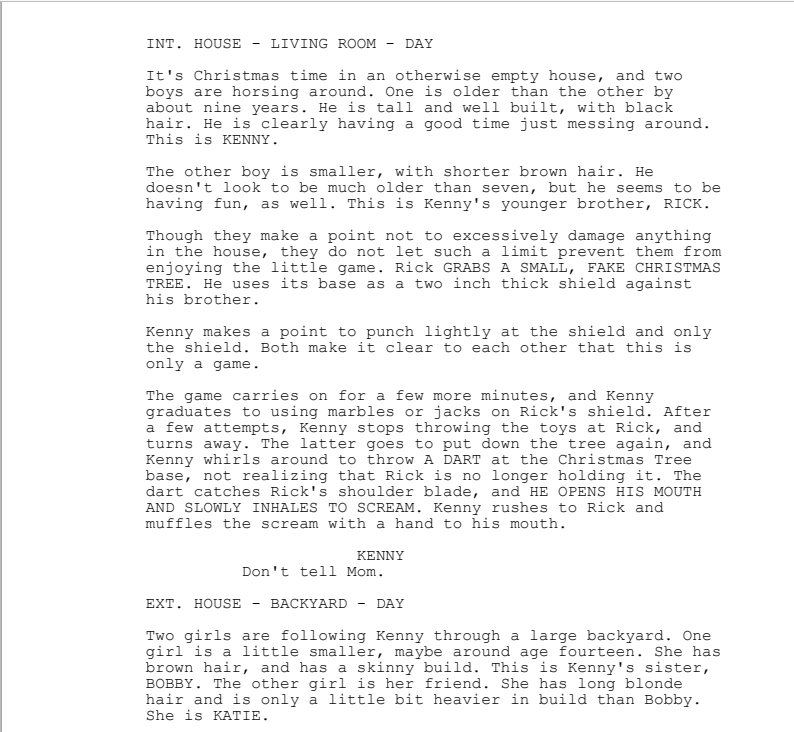
We see two sluglines here, meaning there are two scenes here. Note that we never use "CUT TO." It's not that we aren't allowed to. It's just that we don't need it here. You should also avoid writing "CUT TO" after each piece of dialogue for obvious reasons.
There is so much more for us to cover... but I don't think putting it all in one blog post is such a wise idea. So instead, I'm going to include some sample writing. Only I'm going to write it in the exact way you SHOULDN'T write it. Your job will be to pick out the errors.
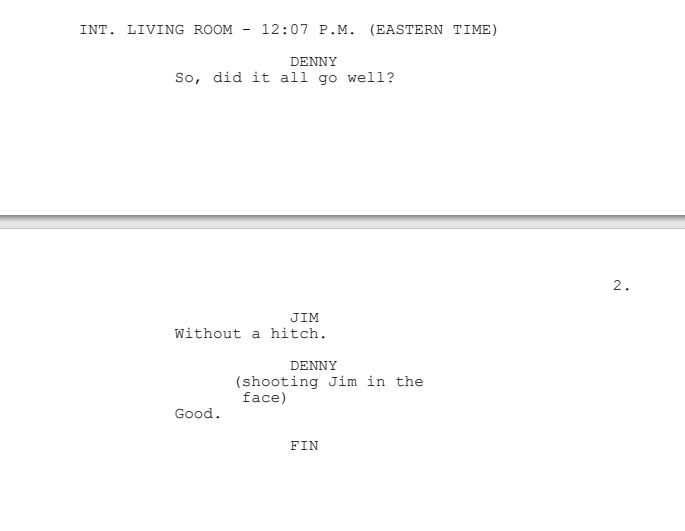 Find all of the errors in this page. Then click open the next spoiler for answers.
Find all of the errors in this page. Then click open the next spoiler for answers.
There is, as I said, a LOT more to cover in this field. We will discuss that another time. In the meantime, I hope this helped if you're in the field for script writing!
-
 2
2




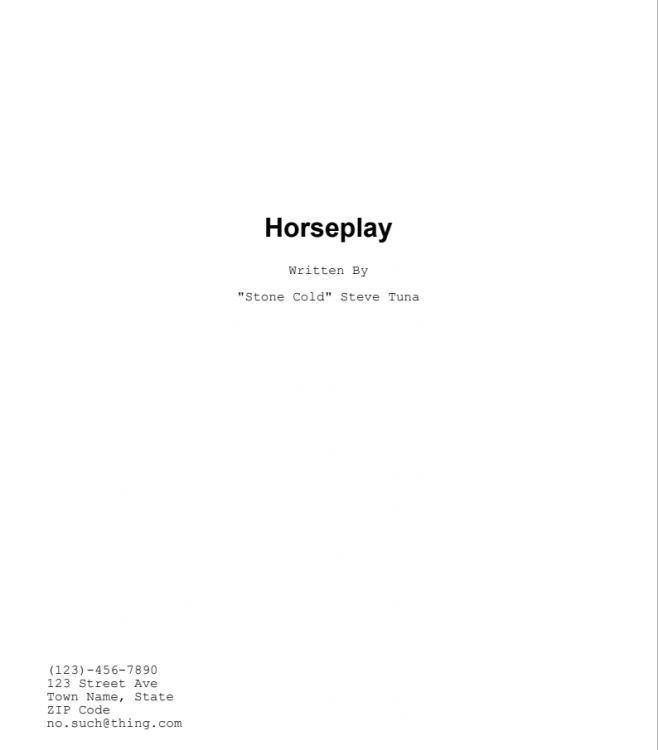
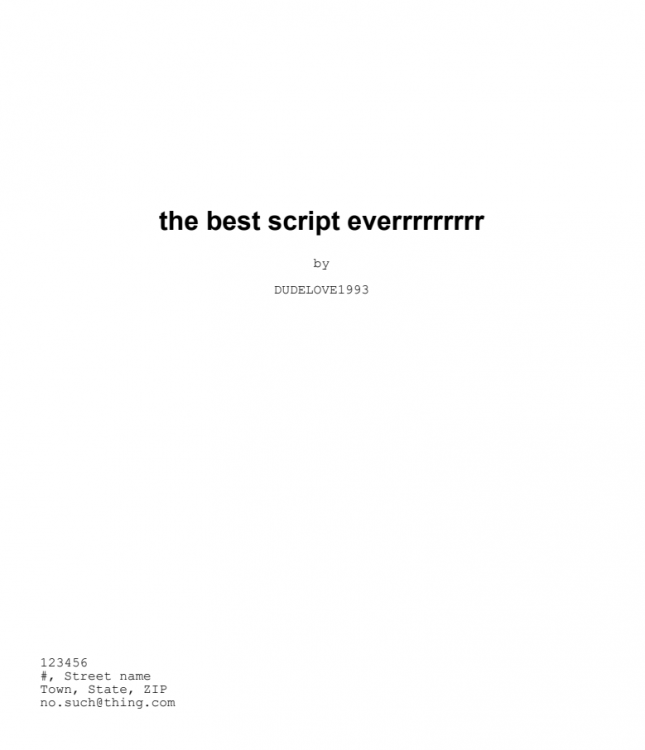
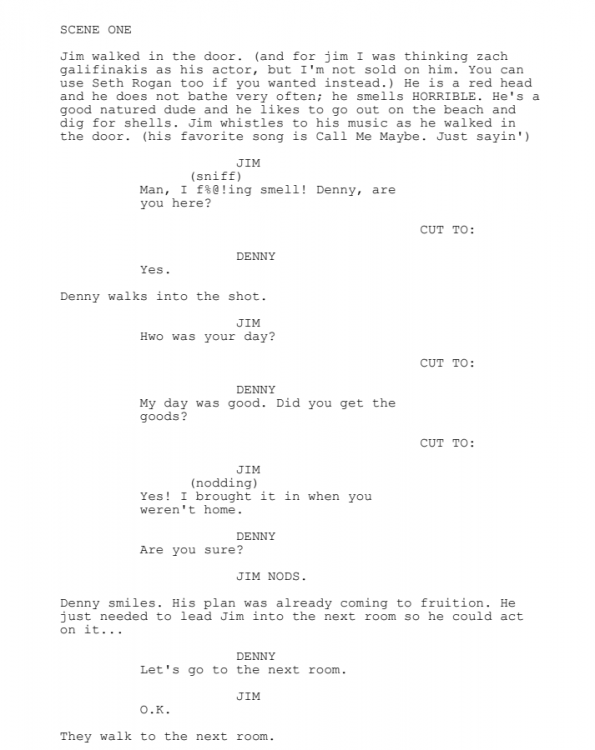
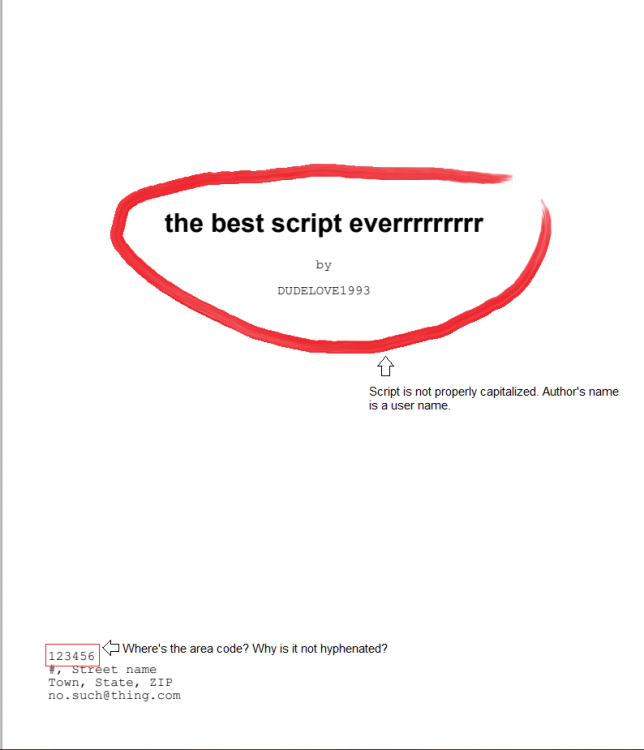
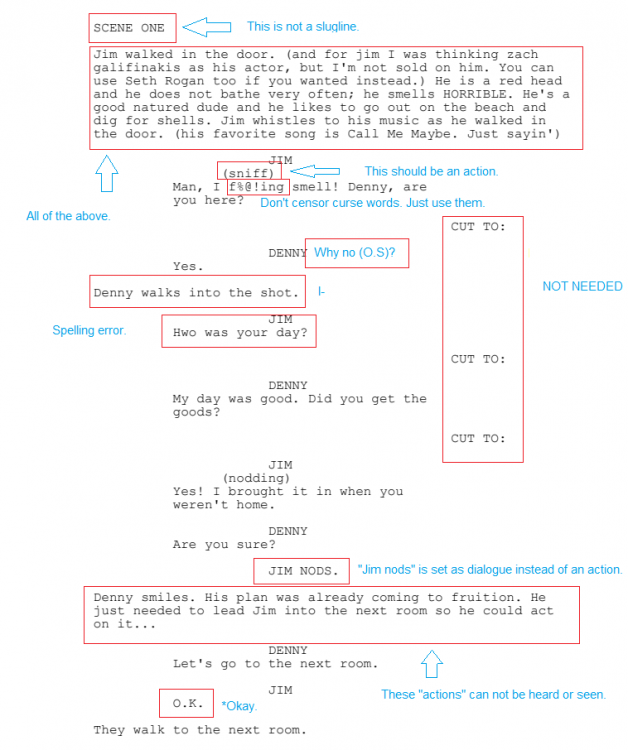
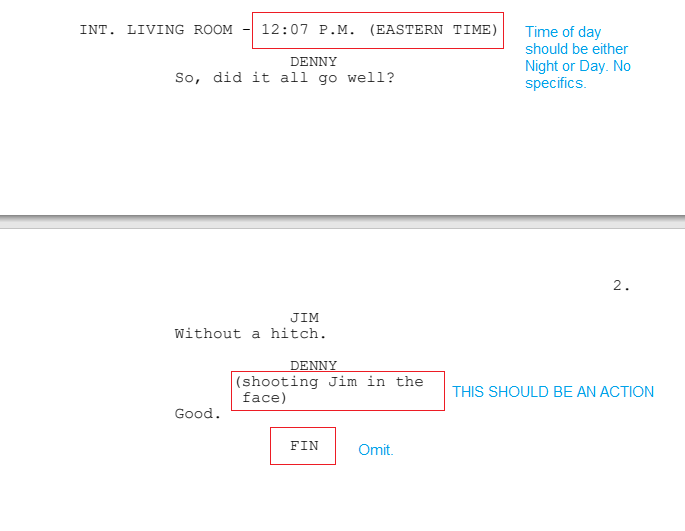
2 Comments
Recommended Comments
Create an account or sign in to comment
You need to be a member in order to leave a comment
Create an account
Sign up for a new account in our community. It's easy!
Join the herd!Sign in
Already have an account? Sign in here.
Sign In Now